Am 15. März war der el salvadorianische Staatsbürger Kilmar Abrego Garcia aus den USA nach El Salvador abgeschoben worden, obwohl für den Betroffenen gültiger gerichtlicher Abschiebeschutz in Bezug auf El Salvador vorlag:
„On March 15, 2025, the United States removed Kilmar Armando Abrego Garcia from the United States to El Salvador, where he is currently detained in the Center for Terrorism Confinement (CECOT). The United States acknowledges that Abrego Garcia was subject to a withholding order forbidding his removal to El Salvador, and that the removal to El Salvador was therefore illegal.“
(Kristi Noem et al. v. Kilmar Armando Abrego Garcia, et al., 604 U. S. ____ (2025); https://www.supremecourt.gov/opinions/24pdf/24a949_lkhn.pdf, S. 1 der Datei [per curiam])
Der District Court Maryland hatte Freitag, den 04.04.2024 entschieden, daß die Regierung die Rückkehr des Betroffenen bis Mitternacht von Montag, den 07.04. zu Dienstag, den 08.04. USA-Zeit „to facilitate and to effectuate“ habe. Kurz vor Ablauf der Frist setzte der Vorsitzende Richter Roberts des US-Supreme Court die District Court-Entscheidung bis zur Entscheidung des Supreme Court-Plenums außer Vollzug.
Am Donnerstag, den 10.04.2025 entschied das Supreme Court-Plenum in Bezug auf den Regierungsantrag, die District Court-Entscheidung aufzuheben („to vacate“):
„The application is granted in part and denied in part, subject to the direction of this order. Due to the administrative stay issued by THE CHIEF JUSTICE, the deadline imposed by the District Court has now passed. To that extent, the Government’s emergency application is effectively granted in part and the deadline in the challenged order is no longer effective. The rest of the District Court’s order remains in effect but requires clarification on remand. The order properly requires the Government to ‚facilitate‘ Abrego Garcia’s release from custody in El Salvador and to ensure that his case is handled as it would have been had he not been improperly sent to El Salvador. The intended scope of the term ‚effectuate‘ in the District Court’s order is, however, unclear, and may exceed the District Court’s authority. The District Court should clarify its directive, with due regard for the deference owed to the Executive Branch in the conduct of foreign affairs. For its part, the Government should be prepared to share what it can concerning the steps it has taken and the prospect of further steps. The order heretofore entered by THE CHIEF JUSTICE is vacated.“
(https://www.supremecourt.gov/opinions/24pdf/24a949_lkhn.pdf, S. 2; Hv. hinzugefügt)
Das Supreme Court-Plenum hat dem Antrag der Trump-Regierung, die District Court-Entscheidung aufzuheben („to vacate“) also ausschließlich insoweit („To that extent“), als die vom District Court gesetzte Frist – aufgrund der Aussetzungsentscheidung des Vorsitzenden Richters – ohnehin bereits verstrichen war, stattgegeben.
Dagegen hat das Supreme Court-Plenum die District Court-Anordnung, die Rückkehr Abrego Garcias „to facilitate and to effectuate“ nicht aufgehoben, sondern – durch Aufhebung der Roberts-Entscheidung („The order heretofore entered by THE CHIEF JUSTICE is vacated.“) – wieder in Vollzug gesetzt, und bloß gesagt, daß
-
der District Court mit dem Wort „effectuate“ vielleicht weiter geht als er gehen darf („may exceed the District Court’s authority“)
-
dem District Court aufgeben, das Gemeinte zu präzisieren: „The District Court should clarify its directive, with due regard for the deference owed to the Executive Branch in the conduct of foreign affairs.“
und
Dies hat der District Court – auch noch am Donnerstag – gemacht:
„the Court hereby amends the Order to DIRECT that Defendants take all available steps to facilitate the return of Abrego Garcia to the United States as soon as possible.“
(https://storage.courtlistener.com/recap/gov.uscourts.mdd.578815/gov.uscourts.mdd.578815.51.0.pdf, S. 1)
Außerdem ordnete das Untergericht am Freitag – nachdem die Regierung eine erste Berichterstattungsfrist hatte weitgehend verstreichen lassen („Defendants […] are reviewing the order and actively evaluating next steps.“) – an:
„it is hereby ORDERED that beginning April 12, 2025, and continuing each day thereafter until further order of the Court, Defendants shall file daily, on or before 5:00 PM ET, a declaration made by an individual with personal knowledge as to any information regarding: (1) the current physical location and custodial status of Abrego Garcia; (2) what steps, if any, Defendants have taken to facilitate his immediate return to the United States; (3) what additional steps Defendants will take, and when, to facilitate his return.“
(https://storage.courtlistener.com/recap/gov.uscourts.mdd.578815/gov.uscourts.mdd.578815.61.0_1.pdf, S. 2)
(Siehe detaillierter zur Vorgeschichte mit Links zu weiteren Dokumenten des Verfahrens: taz-blogs vom 07.04.2025 [Abschnitt „Rückgängigmachung einer Abschiebung nach El Salvador?“] und 11.04.2025 [Artikel „Rückholung eines Abgeschobenen – US-Regierung sträubt sich gegen Supreme Court-Entscheidung und wurde zu täglichen Statusberichten verpflichtet“].)
Am gestrigen Samstag kurz nach 23 Uhr – also einige Minuten nach Fristablauf – reichte die Regierung tatsächlich eine Erklärung bei Gericht ein. Umfang: 1 Seite und ein paar Zeilen. Nur zwei, allenfalls drei Sätze antworten auf die Fragen des Gerichts:
„It is my [Michael G. Kozaks, Senior Bureau Official in the Bureau of Western Hemisphere Affairs, United States Department of Stat] understanding based on official reporting from our Embassy in San Salvador that Abrego Garcia is currently being held in the Terrorism Confinement Center in El Salvador. He is alive and secure in that facility. He is detained pursuant to the sovereign, domestic authority of El Salvador.“
(https://storage.courtlistener.com/recap/gov.uscourts.mdd.578815/gov.uscourts.mdd.578815.63.0_1.pdf, S. 2)
El Salvador – ein bloßer Dienstleister der US-Regierung?
Die Behauptung der Regierung, Abrego Garcia sei „detained pursuant to the sovereign, domestic authority of El Salvador“, ist wenig glaubwürdig. Denn schon in der Entscheidungsbegründung des District Court von Sonntag, den 06.04. hieß es, ohne daß die Regierung dem in den höheren Instanzen konkret entgegengetreten wäre (siehe 1 und 2):
„To effectuate a mass relocation of those detained by the United States, the federal government struck an agreement with El Salvador whereby it would pay the Salvadoran government six-million dollars for placement of the detainees in ‚very good jails at a fair price that will also save our taxpayer dollars.‘ Marco Rubio (@SecRubio), X (Mar. 16, 2025, 7:59 AM), https://x.com/SecRubio/status/1901241933302825470. El Salvador’s President, Nayib Bukele, has publicly touted the agreement terms: ‚We are willing to take in only convicted criminals (including convicted U.S. citizens) into our mega-prison (CECOT) in exchange for a fee.‘ [It is unclear what qualifies as a ‚convicted criminal‘ under the terms of the agreement, but Abrego Garcia has not been convicted of any crime.] ECF No. 10-5 [S. 6]; Nayib Bukele (@nayibbukele), X (Apr. 4, 2025, 10:23 AM), https://x.com/nayibbukele/status/1901245427216978290. According to a memorandum issued by El Salvador’s Ministry of Foreign Affairs, the agreement provides that the detainees will be held ‚for one (1) year, pending the United States’ decision on [their] long term disposition.‘ See Matthew Lee & Regina Garcia Cano, Trump Officials Secretly Deported Venezuelans and
Salvadorans to a Notorious Prison in El Salvador, ASSOCIATED PRESS (Mar. 15, 2025), https://apnews.com/article/trump-deportations-salvador-tren-aragua-64e72142a171ea57c869c3b35eeecce7.
After Abrego Garcia was transferred to CECOT, Defendant, DHS Secretary, Kristi Noem, personally toured the facility alongside senior Salvadoran officials. U.S. Dep’t of Homeland Sec., Inside the Action: Secretary Noem’s Visit to El Salvador, DHS, https://www.dhs.gov/medialibrary/assets/video/59108 (last visited Apr. 4, 2025). From inside the prison walls, Secretary Noem declared that transferring individuals previously detained on U.S. soil to CECOT remains ‚one of the tools in our [the United States’] toolkit that we will use if you commit crimes against the American people.‘ U.S. Dep’t of Homeland Sec., How It’s Going, DHS, https://www.dhs.gov/medialibrary/assets/video/59108 (last visited Apr. 4, 2025) (emphasis added).“
(Memorandum Opinion des District Court Maryland vom 06.04.2025, S. 5 f.; FN 8 [„It ist unclear“] in eckigen Klammern in den Haupttext eingefügt; Hv. hinzugefügt)
„Defendants unilaterally placed hundreds of detainees behind the walls of CECOT without ceding control over the detainees’ fates, as the detainees are in CECOT ‚pending the United States’ decision on their long-term disposition.‘ See Matthew Lee & Regina Garcia Cano, Trump Officials Secretly Deported Venezuelans and Salvadorans to a Notorious Prison in El Salvador, ASSOCIATED PRESS (Mar. 15, 2025), https://apnews.com/article/trump-
deportations-salvador-tren-aragua-64e72142a171ea57c869c3b35eeecce7 […]. Yet, despite Defendants’ power to transfer those awaiting hearings to CECOT for a ‚good price,‘ Defendants disclaim any ability to secure their return, including Abrego Garcia. ECF No. 11 at 11. Surely, Defendants do not mean to suggest that they have wholesale erased the substantive and procedural protections of the INA in one fell swoop by dropping those individuals in CECOT without recourse. Instead, the record reflects that Defendants have ‚outsource[d] part of the [United States’] prison system.” [Nayib Bukele (@nayibbukele), X (Mar. 19, 2025, 8:12 PM), https://x.com/nayibbukele/status/1886606794614587573] See also U.S. Dep’t of Homeland Sec., How It’s Going, DHS, https://www.dhs.gov/medialibrary/assets/video/59108 (last visited Apr. 4, 2025) (quoting Defendant Noem: ‚This facility is one of the tools in our toolkit that we will use‘).” Thus, just as in any other contract facility, Defendants can and do maintain the power to secure and transport their detainees, Abrego Garcia included.“
(ebd., S. 11 f., FN 15 in eckigen Klammern in den Haupttext eingefügt;
vgl. auch noch Court Order denying Motion for stay pending appeal des 4. Appeals Court, S. 10 f.)
Außerdem kam der 1995 geborene Abrego Garcia (Memorandum of Decision and Order vom 10.10.2019) wohl bereits um 2011 in die USA:
„Sometime around 2011, Plaintiff Abrego Garcia entered the United States without inspection. He then made his way to the state of Maryland, where his older brother, a U.S. citizen, resided.“
(Complaint against Nikita Baker, Pamela Bondi, Kenneth Genalo, Todd Lyons, Kristi Noem, Marco Rubio …, filed by A. A.V., Jennifer Stefania Vasquez Sura, Kilmar Armando Abrego Garcia, S. 6 [Nr. 22])
Es ist also wenig wahrscheinlich, daß in El Salvador gegen ihn etwas – zumal etwas Unverjährtes – vorliegt.
„On March 29, 2019, DHS initiated removal proceedings against Abrego Garcia pursuant […]. October 10, 2019, following a full evidentiary hearing, the IJ [Immigration Judge] granted Abrego Garcia withholding of removal to El Salvador […]. For the next six years, Abrego Garcia lived in Maryland with his wife and their three children. ECF No. 1 ¶¶ 24–25. He complied fully with all directives from ICE, including annual check-ins, and has never been charged with or convicted of any crime. ECF No. 1-3, ECF No. 1 ¶ 45.“
(Memorandum Opinion des District Court Maryland vom 06.04.2025, S. 3, 4; Hv. hinzugefügt)
Die angebliche MS-13 Mitgliedschaft von Abrego Garcia
Der Regierungsvorwurf, daß Abrego Garcia Mitglied der gang MS-13 sei – der nichts daran ändert, daß seine Abschiebung unter Verletzung des gerichtlichen Abschiebeschutzes erfolgte – scheint sich ausschließlich auf alte Indizien zu stützen, die der District Court Maryland am 06.04. wie folgt beschrieb:
„On March 29, 2019, DHS initiated removal proceedings against Abrego Garcia […]. Pending resolution of the requested relief, DHS argued for Abrego Garcia to be detained in ICE custody. ECF No. 1 ¶ 30. DHS relied principally on a singular unsubstantiated allegation that Abrego Garcia was a member of MS-13.“
„The ‚evidence‘ against Abrego Garcia consisted of nothing more than his Chicago Bulls hat and hoodie, and a vague, uncorroborated allegation from a confidential informant claiming he belonged to MS-13’s ‚Western‘ clique in New York—a place he has never lived. ECF No. 31.“
(Memorandum Opinion des District Court Maryland vom 06.04.2025, S. 2 mit FN 5)
Seitdem sind nach Ansicht des Gerichts keine neuen Indizien oder gar Beweise hinzugekommen:
„Defendants suggested in their response that the public retains an interest in not returning Abrego Garcia to the United States because ‚he is a danger to the community,‘ ECF No. 11, only to abandon this position at the hearing. Again, with good reason. No evidence before the Court connects Abrego Garcia to MS-13 or any other criminal organization.“
(Memorandum Opinion des District Court Maryland vom 06.04.2025, S. 22 mit FN 19)
Die Erklärung der Regierung bleibt in mehrfacher Hinsicht hinter den Anforderungen des Gerichts zurück
Das Gericht wollte – wie oben schon zitiert – haben:
„a declaration made by an individual with personal knowledge as to any information regarding: (1) the current physical location and custodial status of Abrego Garcia; (2) what steps, if any, Defendants have taken to facilitate his immediate return to the United States; (3) what additional steps Defendants will take, and when, to facilitate his return.“
Zu Punkt (1) hat es – eher vage bekommen -:
„It is my [Michael G. Kozaks, enior Bureau Official in the Bureau of Western Hemisphere Affairs, United States Department of Stat] understanding based on official reporting from our Embassy in San Salvador that Abrego Garcia is currently being held in the Terrorism Confinement Center in El Salvador.“ (Hv. hinzugefügt)
Und zu Punkt (2) und (3) hat es – sofern überhaupt – Folgendes bekommen:
„He is detained pursuant to the sovereign, domestic authority of El Salvador.“ –
… soll wohl heißten: Die Regierung hat nichts unternommen und wird (will) nichts unternehmen, um die Rückkehr von Abrego Garcia in die USA zu „‚facilitate‘ […] and to ensure that his case is handled as it would have been had he not been improperly sent to El Salvador“, wie aber der Supreme Court in seiner Entscheidung von Donnerstag verlangte.
Und die Bedingung „declaration made by an individual with personal knowledge“ ist auch nur allenfalls teilweise erfüllt – Michael G. Kozak schreibt in seiner Erklärung:
„I provide this declaration based on my personal knowledge, reasonable inquiry, and information obtained from other State Department employees.“
(https://storage.courtlistener.com/recap/gov.uscourts.mdd.578815/gov.uscourts.mdd.578815.63.0_1.pdf, S. 1)
Antrag der KlägerInnen/AntragstellerInnen des Verfahrens
Bereits einige Minuten, bevor die Regierungserklärung heute nacht einging, hatten die plaintiffs (Abrego Garcia und Verwandte) ihrerseits einen Schriftsatz eingereicht, indem es auf S. 4 und 5 heißt:
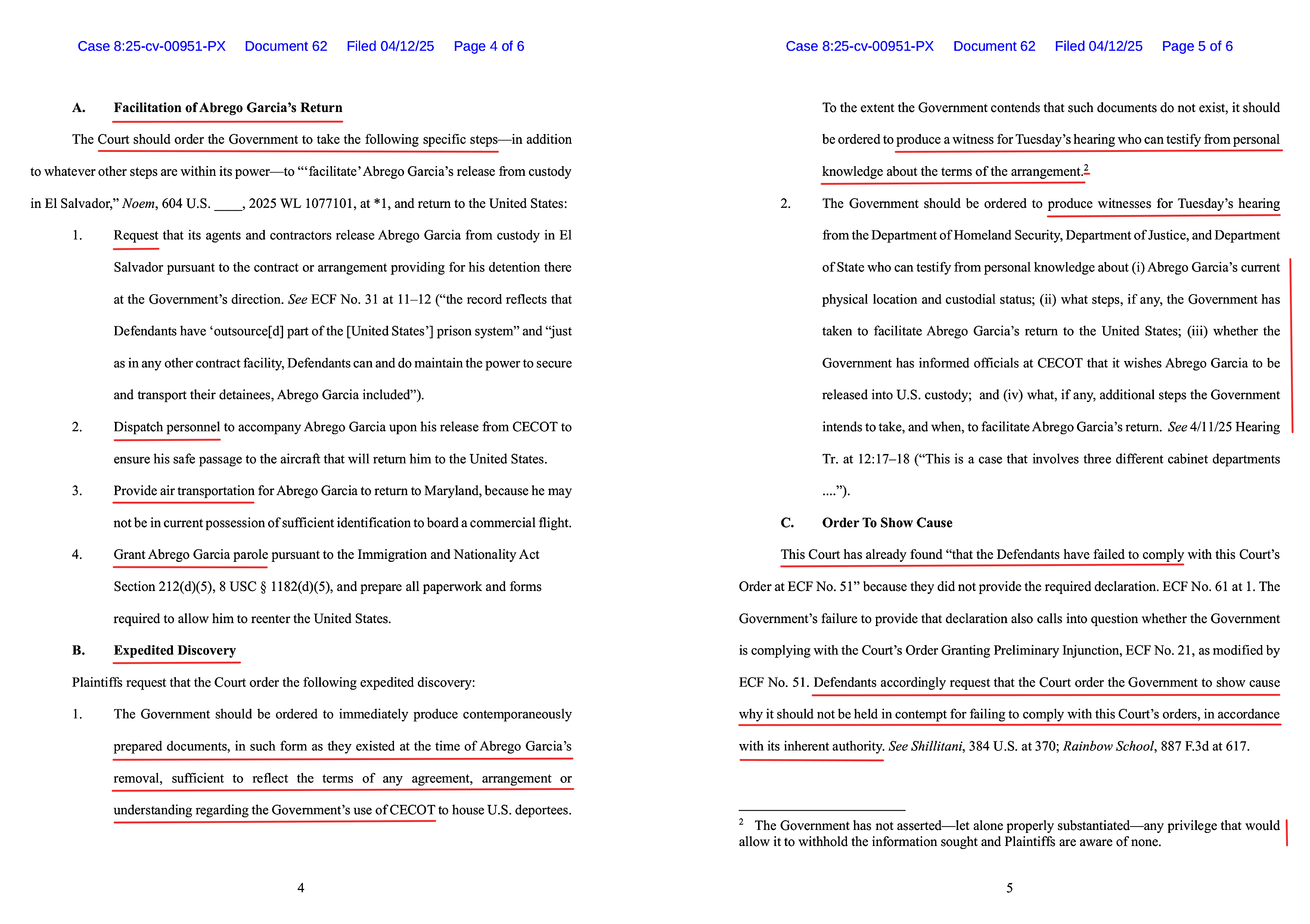
https://storage.courtlistener.com/recap/gov.uscourts.mdd.578815/gov.uscourts.mdd.578815.62.0_1.pdf (6 Seiten)
Statusbericht Nr. 2 der Regierung von Sonntag
Statusbericht Nr. 2 ging Sonntag kurz vor Fristende ein; die beiden Schlüsselsätze sind:
„I also understand that Abrego Garcia is no longer eligible for withholding of removal because of his membership in MS-13 which is now a designated foreign terrorist organization.“ (Hv. hinzugefügt)
„It is my understanding that Defendants have no updates for the Court beyond what was provided yesterday.“
Der erste zitierte Satz steht allein schon deshalb auf wackligen Beinen, weil die Indizien für eine MS-13 Mitgliedschaft von Abrego Garcia (wie oben dargestellt) schon 2019 schwach waren – und die Regierung nichts zur Frage einer etwaigen aktuellen Mitgliedschaft vorgelegt hat. Außerdem hat die Regierung keine Wiederaufnahme oder ähnliches des alten withholding-Verfahrens beantragt – geschweige denn, daß sie damit erfolgreich gewesen wäre.
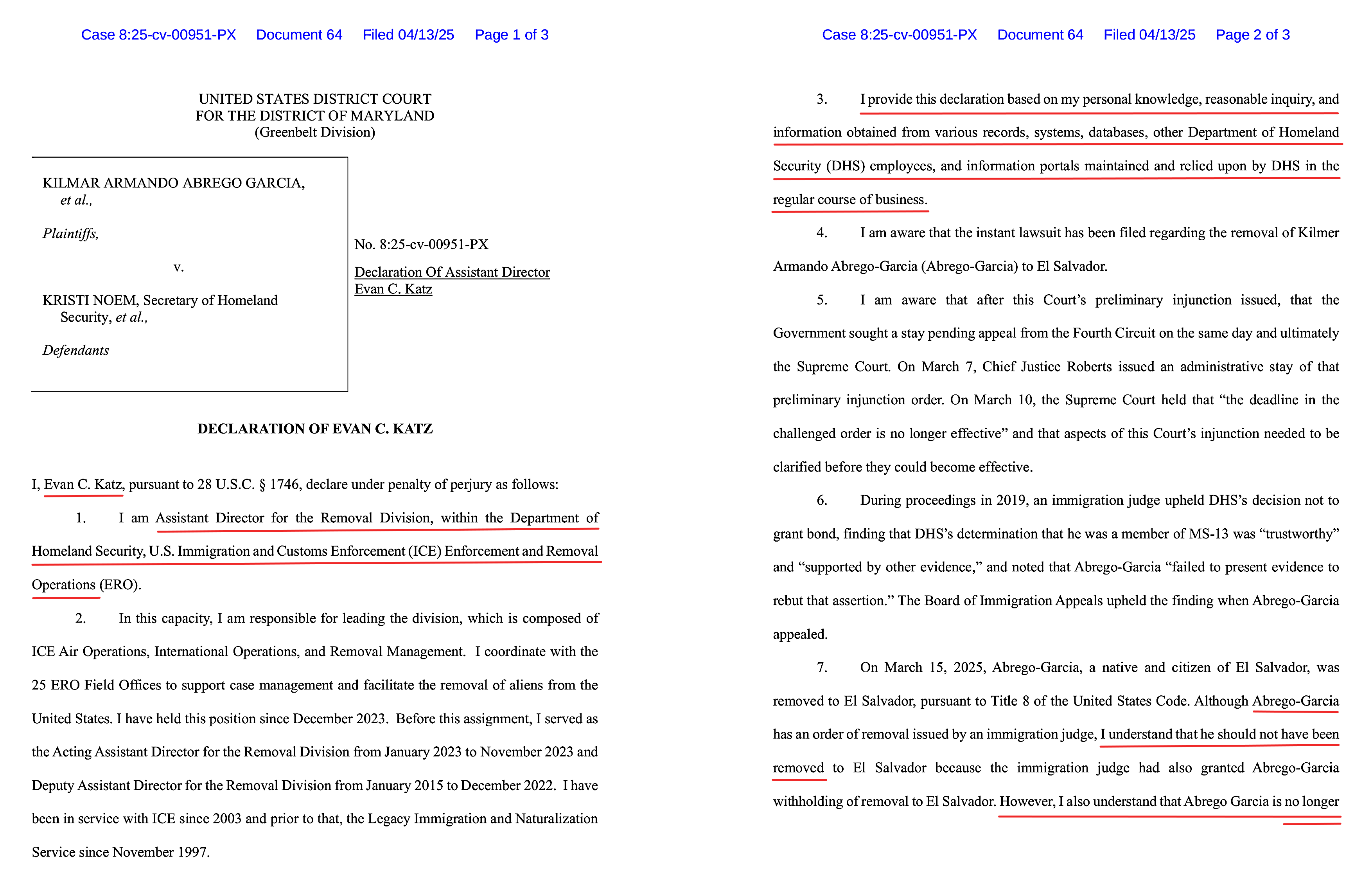
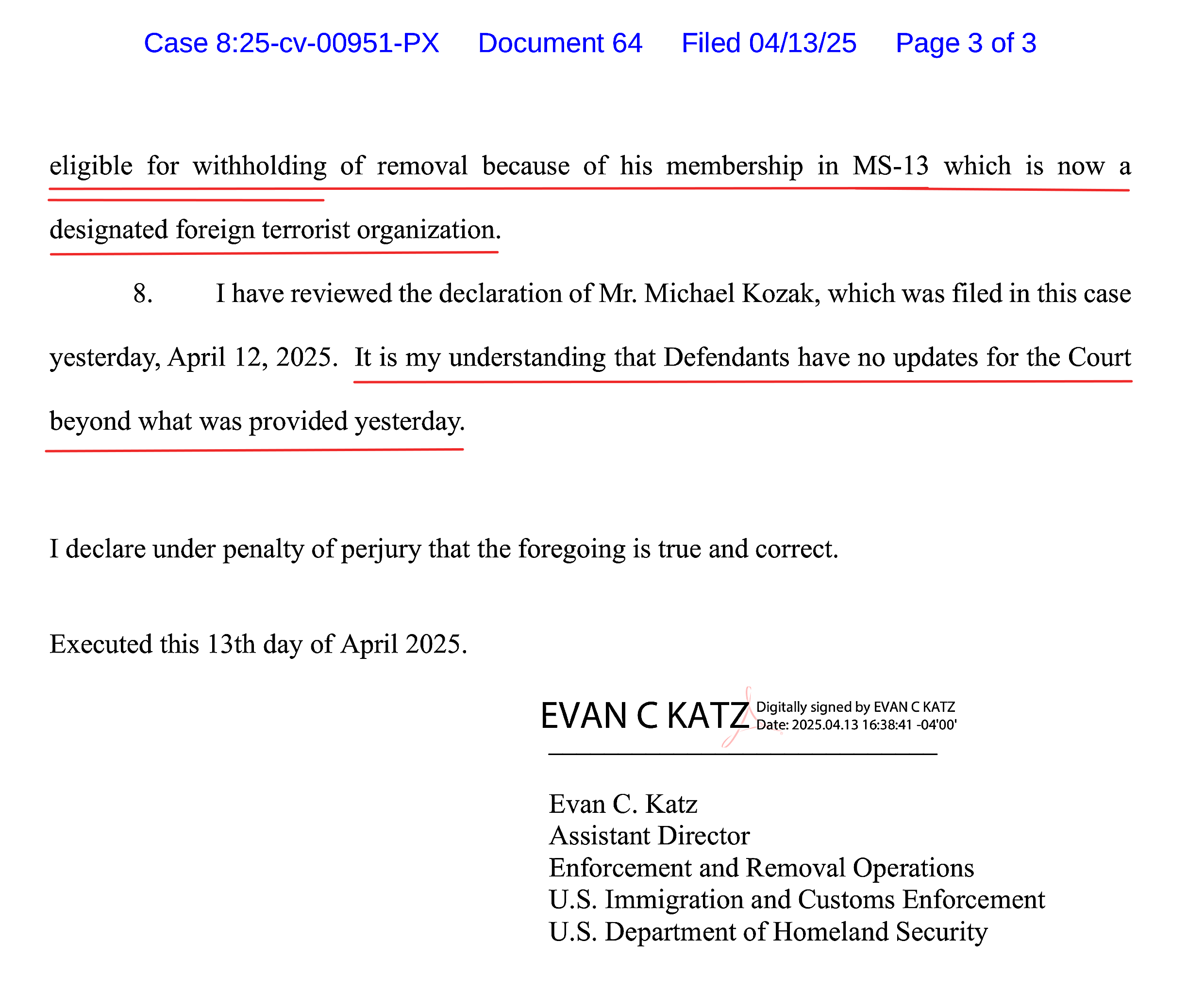
https://storage.courtlistener.com/recap/gov.uscourts.mdd.578815/gov.uscourts.mdd.578815.64.0.pdf (3 Seiten)
RESPONSE [der Regierung] in Opposition re 62 MOTION for Other Relief and Proposed Order
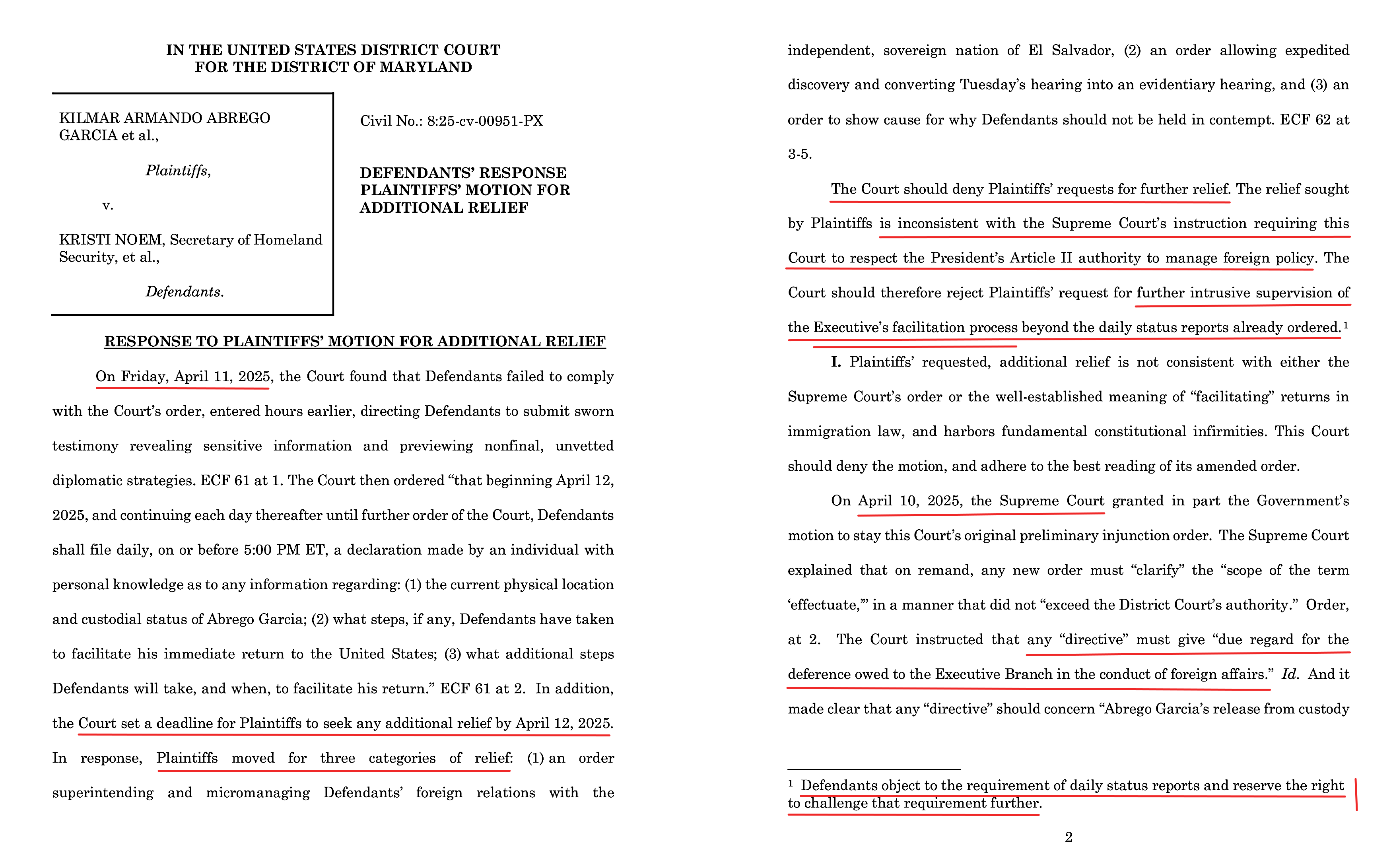
https://storage.courtlistener.com/recap/gov.uscourts.mdd.578815/gov.uscourts.mdd.578815.65.0.pdf (7 Seiten)
In der response heißt es u.a.:
„The Court should therefore reject Plaintiffs’ request for further intrusive supervision of the Executive’s facilitation process beyond the daily status reports already ordered.“
(https://storage.courtlistener.com/recap/gov.uscourts.mdd.578815/gov.uscourts.mdd.578815.65.0.pdf, S. 2)
Allerdings hat die Regierung bisher nicht einmal behauptet, daß sie irgendetwas tut, um die Rückkehr von Abrego Garcia zu „facilitate“. Außerdem versieht sie den Satz mit folgender Fußnote:
„Defendants [= Die Regierung] object to the requirement of daily status reports and reserve the right to challenge that requirement further.“
Im übrigen baut die Regierung in dem Schriftsatz PappkameradInnen auf – nur um sie umhauen zu können:
a)
„Plaintiffs’ […] ask this Court to order Defendants to […] make demands of the El Salvadoran government“ (S. 3; Hv. hinzugefügt
Nein, in dem Antrag der Plaintiffs steht vielmehr:
„Request that its [United State’s] agents and contractors release Abrego Garcia from custody in El Salvador pursuant to the contract or arrangement providing for his detention there at the Government’s direction. See ECF No. 31 at 11–12 (‚the record reflects that Defendants have ‘outsource[d] part of the [United States’] prison system‘ and ‚just as in any other contract facility, Defendants can and do maintain the power to secure and transport their detainees, Abrego Garcia included‘).“
(https://storage.courtlistener.com/recap/gov.uscourts.mdd.578815/gov.uscourts.mdd.578815.62.0_1.pdf, S. 4; Hv. hinzugefügt)
b)
„Any further intrusion into this sensitive process – and any directive from the Court to take action against the nation of El Salvador – would be inconsistent with the care counseled by the Supreme Court.“ (S. 5)
Der Punkt ist vielmehr, daß die US-Regierung El Salvador für ihr gegen US-Recht verstoßendes Vorgehen instrumentalisiert.
Des weiteren macht die Regierung Geheimhaltunsginteressen geltend:
„Plaintiffs’ request for ‚documents . . . reflect[ing] the terms of any agreement, arrangement or understanding regarding the Government’s use of CECOT to house U.S. deportees,” ECF 62 at 4, calls for the immediate production of classified documents, as well as documents that Defendants may elect to assert are subject to the protections of attorney-client privilege and the State Secrets privilege. It would be inappropriate for this Court to hastily order production of these sensitive documents, particularly where Defendants are continuing to regularly update the Court here.“ (S. 5 f.; Hyperlink hinzugefügt)
Am Ende des Schriftsatzes heißt es schließlich noch:
„Plaintiffs began their motion with a quote from the President confirming his respect for the Supreme Court and intention to comply with its order.“ (S. 6)
Siehe zu der fraglichen Trump-Äußerung Nachtrag Nr. 9 meines taz-Blogs-Artikel vom 11.04.2025 sowie https://x.com/joshgerstein/status/1911189488610484333 (Gosh Gerstein [Politico])
Nachtrag von Dienstagvormittag: Statusbericht Nr. 3 der Regierung von Montag
In dem dritten Bericht, der am Montagabend Ostküsten-Zeit mit über einen Stunde Verspätung beim Gericht eingereicht wurde, lautet die entscheidende Passage:
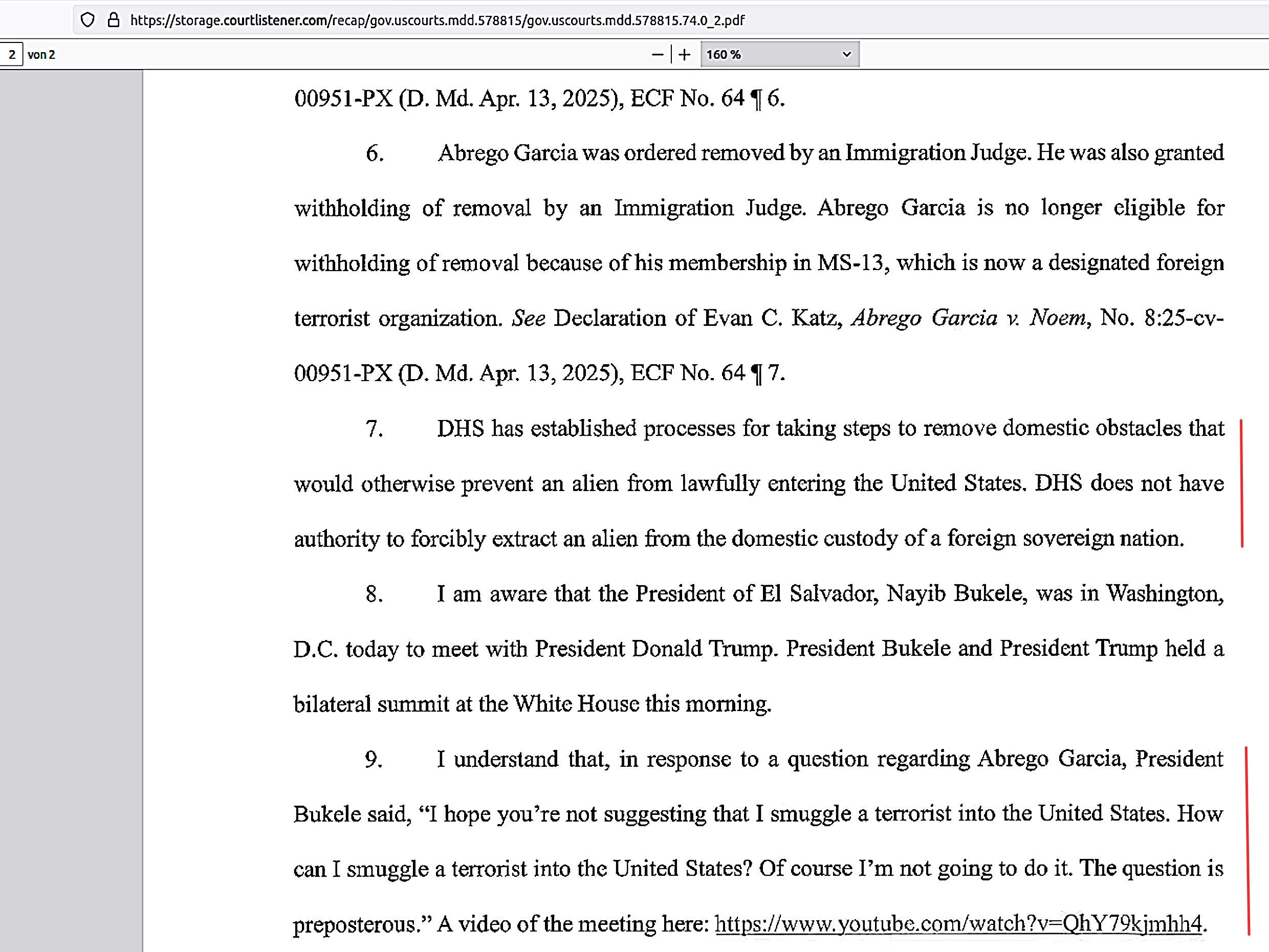
Die Regierungs-Antworten auf die Fragen des Gerichts sind also weiterhin lückenhaft; die nächste mündliche Verhandlung in diesem Verfahren ist am Dienstagabend um 22 Uhr MESZ:
„A follow-up in person hearing will be scheduled for Tuesday, April 15, 2025, at 4:00 PM.“
(https://www.courtlistener.com/docket/69777799/abrego-garcia-v-noem/?filed_after=&filed_before=&entry_gte=&entry_lte=&order_by=desc#entry-61)
PS.: Richtigstellung zu Meldungen im Standard und im Tagesspiegel
In Meldungen im Standard (APA) und im Tagesspiegel (AfP und dpa) heißt es:
„Für die Abschiebungen hatte die US-Regierung ein Kriegsgesetz aus dem Jahr 1798 angewendet.“
Das ist in dieser Pauschalität unzutreffend: Die US-Regierung beruft sich auf das fragliche Gesetz – den Alien Enemies Act – ausschließlich für einen Teil der abgeschobenen, vermeintlichen Tren de Aragua-Mitglieder, im übrigen aber – und zwar insbesondere was el saldorianische Staatsbürger betrifft – auf ’normales‘ US-Ausländerrecht:
„White House press secretary Karoline Leavitt said 261 people were deported in total, including 137 who were removed under the Alien Enemies Act and more than 100 others who were removed via standard immigration proceedings. There were also 23 Salvadoran members of the MS-13 gang, she said.“ (https://www.reuters.com/world/us/group-seeks-answers-deportation-venezuelans-despite-court-order-2025-03-17/)
„The flights carried a total of 261 deportees, the White House later said, including 137 Venezuelans deported under the Alien Enemies Act, 101 under other immigration regulations, and 23 El Salvadoran members of the gang MS-13.“ (https://apnews.com/article/trump-alien-enemies-act-venezuelans-deportations-prison-e6cd083dcf5e213f7b2bd3bf43d27aaa)



